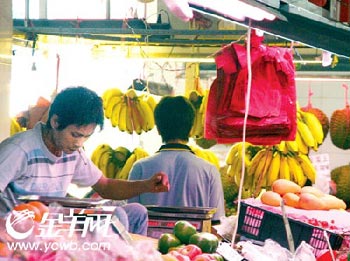For years, no trip to rural China was without scenes of plastic bags gathering like patches of white snow. No city street was clear of bags blowing through the air.
A year after the government enacted the Regulation on Limiting Production, Sales and Usage of Plastic Shopping Bags, plastic bag pollution is slowly clearing from the landscape, but still some bad habits die hard.
 |
|
File photo: Vendors usually offer ultra-thin plastic bags, supplied by thousands of illegal workshops, to customers because they are cheap, costing less than half of one US cent. Legal, thicker bags cost around three US cents depending on size.
|
On June 1 last year, all stores - from major supermarkets to small shops - were banned from giving out free plastic shopping bags to customers. The production and sale of bags thinner than 0.025 mm was also prohibited, however, thicker plastic bags are allowed. Customers must pay for them.
The law encouraged millions of Chinese to switch from plastic to fabric or other reusable bags. Most retailers obeyed the ban to avoid a fine of up to 10,000 yuan (US$1,464).
"Environmental awareness among customers has risen noticeably. About eight in 10 customers carry their own bags when shopping and less than 20 percent of customers pay for plastic bags," says Ji Honghui, manager of a supermarket owned by the Dannis retail group based in Zhengzhou, capital of central Henan Province.
Before the ban, Ji's store gave out more than 15,000 free plastic bags each day. Now it sells about 200 plastic bags a day.
Nationwide, the use of plastic bags at supermarkets is down an average of 66 percent since the ban, according to a survey released on May 20 by the China Chain Store and Franchise Assn.
That means that since June, 40 billion fewer plastic bags have been given out at supermarkets, the survey showed.
Zhang Boju, head of the research department of Friends of Nature, the first non-government environmental organization in China, said the use of plastic bags at supermarkets fell from 1 billion a day before the ban to 200 million or 300 million a day now.
Before the ban, another 2 billion bags were given out each day at places other than supermarkets, according to the China Plastics Processing Industry Assn.
Most of the positive results, however, are seen only in big cities.
Countryside stalls still provide customers with free plastic bags, many of which are the banned ultra-thin bags.
"Almost all dealers offer free plastic bags," says Li Ming, a vegetable store owner at a farm produce market on the edge of Zhengzhou.
"I don't dare charge my customers for plastic bags because of the competition. If I charged them, I would offend them and lose them.
A bundle of vegetables is just worth just a few jiao. How can I charge customers for a plastic bag?" he asks. One jiao is equivalent to 0.1 yuan (1.5 US cents).
Vendors usually offer ultra-thin plastic bags, supplied by thousands of illegal workshops, to customers because they are cheap, costing less than half of one US cent. Legal, thicker bags cost around three US cents depending on size.
In Henan, home to hundreds of underground bag factories, an industry insider told Xinhua the number of makers rose quickly after the June 1 ban because of low investment and technological requirements as well as a wide supply gap following the closure of major factories.
"Setting up a workshop usually costs less than 100,000 yuan and one bag making machine might bring in up to 10,000 yuan in profit a month," said the workshop owner who requested anonymity before granting an interview.
The government's regulation forced the closure of many major manufacturers, including China's largest plastic bag producer, Huaqiang, based in Henan. As a result, many technicians began to set up or work for underground workshops.